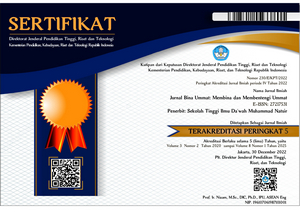CULTIVATING DA’WAH MANAGEMENT FOR RELIGIOUS MODERATION IN MULTICULTURAL AREAS: A SYSTEMATIC LITERATURE REVIEW
DOI:
https://doi.org/10.38214/jurnalbinaummatstidnatsir.v6i2.208Keywords:
Da’wah Management, Religious Moderation, Multicultural Areas, Religious EducationAbstract
To ensure that society effectively embraces the true teachings of Islam as da'wah partners, managing da'wah entails implementing a well-organized da'wah initiative. Da'wah transcends geographical boundaries and is not confined to Islamic regions. Indonesia, being a varied country, naturally has several multicultural regions characterized by different faiths, ethnicities, and races. Effectively managing diversity is a complex task that necessitates mutual understanding, comprehension, and recognition of the fact that we are inherently diverse as creations of God. Therefore, it is necessary to cultivate a mindset of religious moderation that is independent of political or personal agendas and free from doctrinal rigidity. However, this does not imply being unethical, but rather avoiding radical perspectives while examining and comprehending current issues. Thus, this study aimed to develop strategies for da'wah management activities that encourage religious moderation in multicultural areas. In order to accomplish this aim, a methodical examination of existing literature was conducted by utilizing Boolean operators throughout the search process on the selected database. The ERIC indexed-journal database was selected using boolean operators due to their combinations of reputable journal sources in the educational field. The authors utilized several choices and ultimately arrived at a total of nine research articles. The findings reveal that religious moderation includes more than simply limiting the attitudes and actions of religious authorities. It also involves leading the process or phases in a managerial manner. It recommends that prospective authors address this gap through practical study.
Published
Versions
- 2023-12-31 (3)
- 2023-12-31 (2)
- 2023-12-31 (1)
Issue
Section
This work is licensed under a Lisensi Creative Commons Atribusi 4.0 Internasional.
Authors who publish with this journal agree to the following terms:
- Authors retain copyright and grant the journal right of first publication with the work simultaneously licensed under a Creative Commons Attribution License that allows others to share the work with an acknowledgment of the work's authorship and initial publication in this journal.
- Authors are able to enter into separate, additional contractual arrangements for the non-exclusive distribution of the journal's published version of the work (e.g., post it to an institutional repository or publish it in a book), with an acknowledgment of its initial publication in this journal.
- Authors are permitted and encouraged to post their work online (e.g., in institutional repositories or on their website) prior to and during the submission process, as it can lead to productive exchanges, as well as earlier and greater citation of published work (See The Effect of Open Access).




